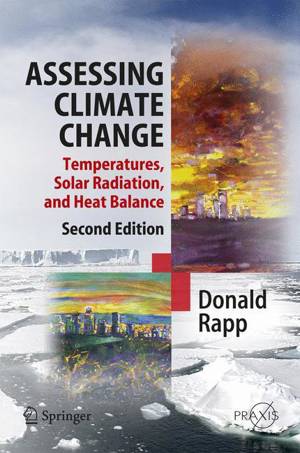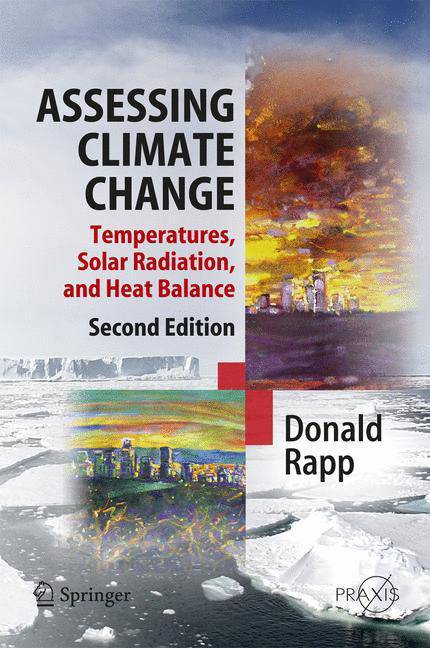
Bedankt voor het vertrouwen het afgelopen jaar! Om jou te bedanken bieden we GRATIS verzending (in België) aan op alles gedurende de hele maand januari.
- Afhalen na 1 uur in een winkel met voorraad
- In januari gratis thuislevering in België
- Ruim aanbod met 7 miljoen producten
Bedankt voor het vertrouwen het afgelopen jaar! Om jou te bedanken bieden we GRATIS verzending (in België) aan op alles gedurende de hele maand januari.
- Afhalen na 1 uur in een winkel met voorraad
- In januari gratis thuislevering in België
- Ruim aanbod met 7 miljoen producten
Zoeken
€ 179,45
+ 358 punten
Uitvoering
Omschrijving
Despite the inadequacies of the temperature measurement network, there is little doubt that much of the Earth has been undergoing a moderate warming since about the start of the 20th century, although this warming has been more pronounced in some areas, and it wavered in mid-century. A critical question facing mankind is: Has this global warming been primarily due to natural fluctuations (e.g. increases in total solar irradiance (TSI) coupled to positive feedback effects, changes in ocean heat transport flows, or other variations) or anthropogenic impacts (primarily greenhouse gas production)?
Global warming alarmists believe that the increases in 20th century temperatures are mainly due to increases in greenhouse gases and offer the "hockey stick" picture of global temperature history as evidence of the uniqueness of the 20th century. Nay-sayers dispute these predictions, claiming that the recent rise in temperature has significant regional exceptions, and is likely to be just another in a series of natural fluctuations in climate, not associated with greenhouse gases. They place little faith in climate models, and claim that the "hockey stick" picture of global temperature history is a "fraud" approaching the dimensions of cold fusion.
Published books on global warming and climate change tend to reflect the views of either the alarmists or the nay-sayers. They often start with the conclusion and then attempt to build the case by selecting or analyzing the data to support their thesis, e.g. global warming as a great threat or global warming as a fiction. In this book Donald Rapp attempts to assess the evidence in an objective way. Although he is not a climate scientist by profession, very few climate scientists have taken a broad systems view of the problem of global warming. Donald Rapp is a professional systems engineer, having taught in universities for 14 years and with over 25 years experience managing various programs for NASA. His experience has required the ability to move into a highly technical field, assimilate the content, organize the knowledge base and succinctly describe the field, its content, its unresolved issues and achievements. This is precisely what Donald Rapp does in this book in relation to global climate change. As such his approach is refreshingly different.
Global warming alarmists believe that the increases in 20th century temperatures are mainly due to increases in greenhouse gases and offer the "hockey stick" picture of global temperature history as evidence of the uniqueness of the 20th century. Nay-sayers dispute these predictions, claiming that the recent rise in temperature has significant regional exceptions, and is likely to be just another in a series of natural fluctuations in climate, not associated with greenhouse gases. They place little faith in climate models, and claim that the "hockey stick" picture of global temperature history is a "fraud" approaching the dimensions of cold fusion.
Published books on global warming and climate change tend to reflect the views of either the alarmists or the nay-sayers. They often start with the conclusion and then attempt to build the case by selecting or analyzing the data to support their thesis, e.g. global warming as a great threat or global warming as a fiction. In this book Donald Rapp attempts to assess the evidence in an objective way. Although he is not a climate scientist by profession, very few climate scientists have taken a broad systems view of the problem of global warming. Donald Rapp is a professional systems engineer, having taught in universities for 14 years and with over 25 years experience managing various programs for NASA. His experience has required the ability to move into a highly technical field, assimilate the content, organize the knowledge base and succinctly describe the field, its content, its unresolved issues and achievements. This is precisely what Donald Rapp does in this book in relation to global climate change. As such his approach is refreshingly different.
Specificaties
Betrokkenen
- Auteur(s):
- Uitgeverij:
Inhoud
- Aantal bladzijden:
- 374
- Taal:
- Engels
- Reeks:
Eigenschappen
- Productcode (EAN):
- 9783642019876
- Uitvoering:
- Hardcover
- Afmetingen:
- 155 mm x 235 mm

Alleen bij Standaard Boekhandel
+ 358 punten op je klantenkaart van Standaard Boekhandel
Beoordelingen
We publiceren alleen reviews die voldoen aan de voorwaarden voor reviews. Bekijk onze voorwaarden voor reviews.









